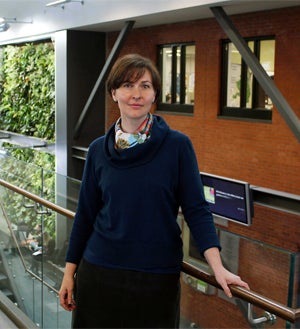
Sustainable water policies: one decision at a time
More than pipes and policies: Waterloo researcher looks at how psychology and culture affect decisions about water

More than pipes and policies: Waterloo researcher looks at how psychology and culture affect decisions about water
By Sam Toman Faculty of Environment Strip out everything in our lives and there are only a handful of things we absolutely cannot live without. Water is at the top of this list. Since the beginning of human history, our ancestors were constantly forced to make decisions to secure their water supply.
Strip out everything in our lives and there are only a handful of things we absolutely cannot live without. Water is at the top of this list. Since the beginning of human history, our ancestors were constantly forced to make decisions to secure their water supply.
Sarah Wolfe, a researcher in Environment and Resource, uses environmental psychology to observe how decision making about water is wired into our consciousness, our culture – and how it shapes societies’ interaction with the water.
“I want to get underneath the explanations of political will, economic incentives, policies and regulations and understand what’s happening at the individual level,” Wolfe says. “If we can understand why and how people, including the experts, make certain emotion-driven decisions around water, then perhaps we can make water governance processes and negotiations even more effective across increasingly diverse groups of stakeholders.”
Applying terror management theory to water

According to Wolfe, one aspect of this, “why and how” might be understood through the lens of terror management theory. The theory holds that the unique human emotion of fear is so profound; we spend our lives constrained by cultural norms and building things like monuments and even public works projects to give our temporary lives meaning, secure resources and power and thus mitigate this fear.
“It’s early days yet but I currently have students searching for evidence of terror management theory indicators in post-Walkerton media, in public and private bottled water campaigns, and in historical documents written around major infrastructure projects,” says Wolfe.
A subsequent study will unpack the relationship between supply and demand management paradigms using terror management theory.
Moving from economics to emotion
Wolfe began researching water while studying abroad as an undergraduate in the city of Haifa. The University of Waterloo’s recent research partnership with Technion-Israel Institute of Technology in Haifa includes co-operation between the institutions on water issues.
Not only is water there a scarce and carefully managed resource, but its management directly impacts many of the cultural, religious, political and built landscapes at the core of terror management theory.
"Water people - experts all over the world - are a funny bunch. We talk about the pipes, prices and policies but what remains unsaid is our emotional connection to water that motivates us. I want to find out more about this motivation and then use that knowledge for decision making and negotiations."

Read more
The Future Cities Institute founded by CAIVAN will bring together leading minds from across sectors to solve the most challenging and urgent issues facing global cities.

Read more
The gift comes from two Waterloo alumni with passion and drive to have transformative impact

Read more
University of Waterloo and leading real estate developer The Caivan Group launch the Future Cities Institute
The University of Waterloo acknowledges that much of our work takes place on the traditional territory of the Neutral, Anishinaabeg and Haudenosaunee peoples. Our main campus is situated on the Haldimand Tract, the land granted to the Six Nations that includes six miles on each side of the Grand River. Our active work toward reconciliation takes place across our campuses through research, learning, teaching, and community building, and is co-ordinated within the Office of Indigenous Relations.